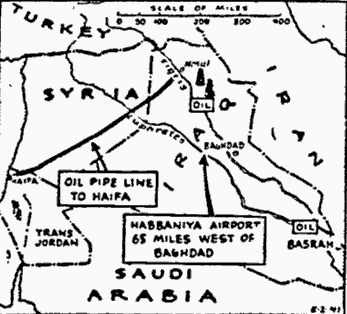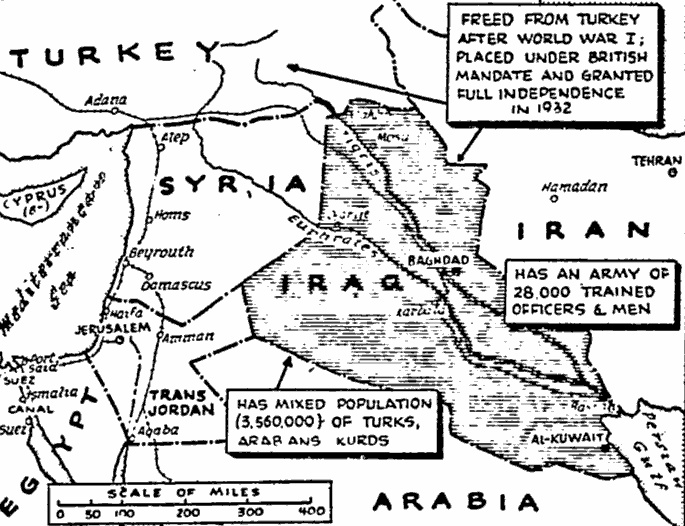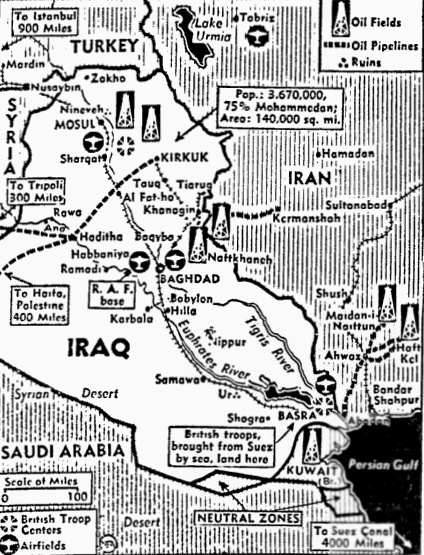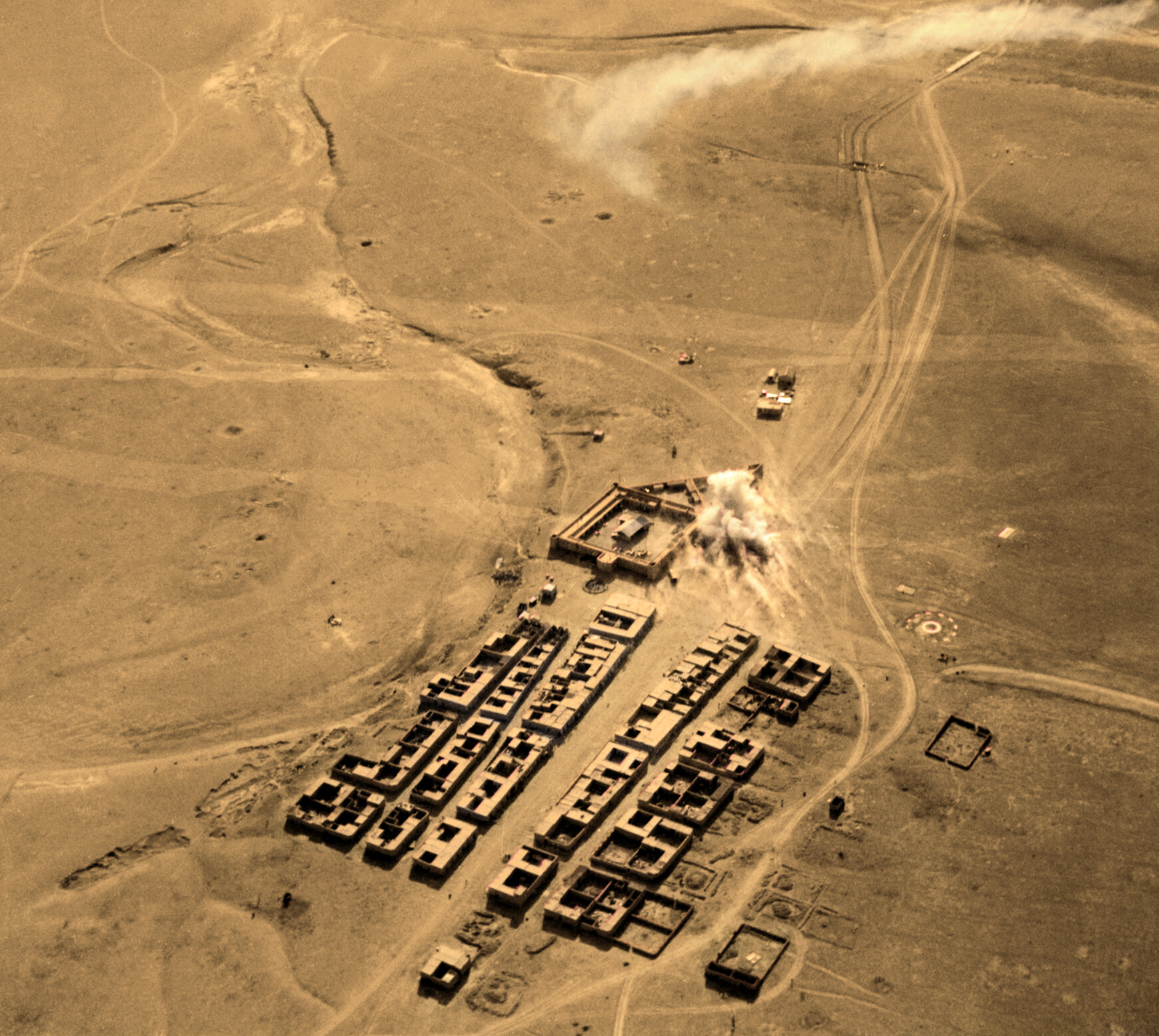U.S. Department of State (April 30, 1941)
740.0011 European War 1939/10502: TelegramThe Minister Resident in Iraq to the Secretary of State
Baghdad, April 30, 1941 — 5 p.m.
[Received 10:30 p.m.]
110.Midnight last night mobile units Iraqi Army including tanks, armored cars, field guns, cavalry and infantry commenced passing Legation from their nearby base. I sent for British intelligence officer, my neighbor. He went to Embassy and from there notified British Air Base at Habbaniyah. This was first notice they received of the event. This Iraqi Army proceeded to Habbaniyah arriving before dawn and took up commanding positions on heights overlooking the air base. The commander of the base was then informed that the army was engaged in exercises and that if any British planes should leave the ground the army would attack. The reply was that the British Air Force was also under instructions to exercise and that if Iraqi Army should interfere it would be considered an act of war. British Air Force believe they can dispose of Iraqi Army in short order.
Iraqi Government has issued notice informing public they have offered British all facilities in accordance with treaty but that British have made demands which infringe Iraq’s sovereignty and consequently the army has taken charge and will defend sovereign rights of country.
A mixed lot of Americans and miscellaneous foreigners and some Iraqi subjects numbering about 100 fearing mob violence have taken refuge in Legation.
KNABENSHUE
The Pittsburgh Press (May 2, 1941)
NEAR EASTERN WAR FLARES IN OIL FIELDS
…
Pro-Axis Baghdad troops started shelling, London says
…
BULLETIN
London, May 2 –
Radio Berlin tonight from Baghdad that Iraqi troops have occupied airdromes, strategic road junctions and oil fields in Iraq.
By Wallace Carroll, United Press staff writer

London, May 2 –
British Empire forces were reliably reported today to have clashed with the troops of the pro-Axis Iraqi government on a new Near Eastern war front after Iraqi artillery shelled the British air base at Habbaniya.
It was reported in reliable quarters that Iraqi forces today opened the attack.
British forces stationed at the key Habbaniya Airdrome were believed to have replied to the Iraqi fire.
Says treaty is broken
Informed sources said:
It may be assumed that the British force at Habbaniya has taken any action necessary.
The German radio, as heard in New York by NBC and CBS, reported that Iraqi reservists have been mobilized and have occupied the vital Mosul oil fields and stationed a strong guard around Basra, a Persian Gulf port where Imperial Forces sent to Iraq were landed.
It was said reliably that the Iraqi action in attacking the Habbaniya Airport constituted a breach of the Anglo-Iraqi treaty, presumably freeing the British to take whatever action they regard as necessary to safeguard their interests in this strategic backdoor to Turkey, Syria, Palestine and Mesopotamia.
British circles claimed that “the mass of Iraq is not behind the usurper now wielding power in Baghdad,” but declined to speculate on the possibility of a British-armed occupation of the Iraqi capital.
Reports here were sketchy on the action around Habbaniya and it was not certain whether the clash was merely a skirmish or a prelude to wider action.
BBC reports, heard here by CBS and NBC, claimed that British women and children had been assembled at Habbaniya after being evacuated from Baghdad under safe conducts granted by the Iraqi government.
Has 28,000 in Army
The second contingent of British troops landed at the Iraqi port of Basra yesterday over the protest of the Baghdad government.
Baghdad, controlled by a government installed by a coup d’état last month, reported in some quarters to have been engineered by Germany, has at its disposal an army, including the air force, of 28,000 officers and men.
Iraq is of vital importance to the British because of the Mosul oil fields, the pipeline to Haifa, on the Mediterranean, and its position immediately south of Turkey to thwart a possible German route to challenge British control of the Suez Canal, the Red Sea and the Eastern Mediterranean.
Since 1936, Iraq has had a compulsory military training of 18 months to two years for all men of 19 to 25. The Defense Ministry has been advised by a British military mission. With an area of 116,000 square miles, Iraq has a population of about 3.5 million, mostly Muslim.
From Basra, a railroad winds 345 miles to Baghdad and a narrow gauge railway connects Baghdad with the northern town of Kirkuk, 201 miles away. A railway also connects Mosul with the Syrian railways.



